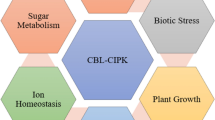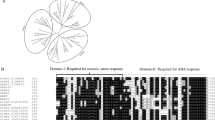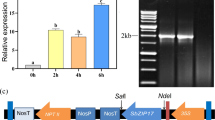Abstract
The expression of the soybean Bowman–Birk proteinase isoinhibitor DII (BBI-DII) gene and the inducible activity of its promoter were studied under salt, drought, low temperature, and abscisic acid (ABA) exposure conditions. The BBI-DII gene was induced by salt, drought, low temperature, and ABA, and the relative expression levels were 103.09-, 107.01-, 17.25- and 27.24-fold, respectively, compared with the untreated control. The putative promoter, designated BP1 (− 1255 to + 872 bp), located 5′-upstream of the BBI-DII gene was cloned. The expression of the GUS gene in pCAM-BP1 transgenic tobacco plants was highest at 5 h after treatment with salt, drought, low temperature and ABA, especially under salt and drought. Using histochemical staining and fluorescence analysis of GUS, BP1 activity under salt and drought conditions after 5 h was 1.03 and 1.07-fold, respectively, compared with that of the CaMV35S promoter. Based on a 5′ deletion analysis, the segment (+ 41 to + 474 bp) was the basal region that responded to salt and drought, whereas the segment (− 820 to + 41 bp) was the area that responded to increased salt and drought activity. The BP2 (− 820 to + 872) activities were 0.98- and 1.02-fold compared with that of BP1 under salt and drought conditions and was 435 bp shorter than BP1. The salt- and drought-inducible activities of the BP2 promoter in the roots, stems, and leaves of transgenic tobacco plants were stable. Taken together, BP2 is more suitable than the BP1 promoter for the study and molecular breeding of stress-resistant soybean plants.






Similar content being viewed by others
References
Alok A, Kaur J, Tiwari S (2020) Functional characterization of wheat myo-inositol oxygenase promoter under different abiotic stress conditions in Arabidopsis thaliana. Biotechnol Lett 42(10):2035–2047. https://doi.org/10.1007/s10529-020-02967-1
Arya H, Singh MB, Bhalla PL (2021) Towards developing drought-smart soybeans. Front Plant Sci 12:750664. https://doi.org/10.3389/fpls.2021.750664
Banu SA, Kamrul Huda KM, Tuteja N (2014) Isolation and functional characterization of the promoter of a DEAD-box helicase Psp68 using Agrobacterium-mediated transient assay. Plant Signal Behav 9:e28992. https://doi.org/10.4161/psb.28992
Barros BA, Silva WG, Moreira MA, Barros EG (2012) In silico characterization and expression analysis of the multigene family encoding the Bowman-Birk protease inhibitor in soybean. Mol Biol Rep 39(1):327–334. https://doi.org/10.1007/s11033-011-0742-1
Bendre AD, Suresh CG, Shanmugam D, Ramasamy S (2019) Structural insights into the unique inhibitory mechanism of Kunitz type trypsin inhibitor from Cicer arietinum L. J Biomol Struct Dyn 37(10):2669–3267. https://doi.org/10.1080/07391102.2018.1494633
Cheng J, Wei F, Zhang MF, Li N, Song TQ, Wang Y, Chen DS, Xiang JS, Zhang XK (2021) Identification of a 193 bp promoter region of TaNRX1-D gene from common wheat that contributes to osmotic or ABA stress inducibility in transgenic Arabidopsis. Genes Genomics 43(9):1035–1048. https://doi.org/10.1007/s13258-021-01115-x
Dey N, Sarkar S, Acharya S, Maiti IB (2015) Synthetic promoters in planta. Planta 242(5):1077–1094. https://doi.org/10.1007/s00425-015-2377-2
Divya K, Kishor PB, Mathur PB, Singam P, Sharma KK, Vadez V, Reddy PS (2019) Isolation and functional characterization of three abiotic stress-inducible (Apx, Dhn and Hsc70) promoters from pearl millet (Pennisetum glaucum L.). Mol Biol Rep 46(6):6039–6052. https://doi.org/10.1007/s11033-019-05039-4
Dong W, Gao TX, Wang Q, Chen JF, Lv J, Song YG (2020) Salinity stress induces epigenetic alterations to the promoter of MsMYB4 encoding a salt-induced MYB transcription factor. Plant Physiol Biochem 155:709–715. https://doi.org/10.1016/j.plaphy.2020.08.015
Fu JY, Yan XX, Jiang D (2021) Assessing the sweet sorghum-based ethanol potential on saline–alkali land with DSSAT model and LCA approach. Biotechnol Biofuels 14(1):44. https://doi.org/10.1186/s13068-021-01896-z
Gan TT, Lin ZW, Bao LJ, Hui T, Cui XP, Huang YZ, Wang HX, Su C, Jiao F, Zhang MJ, Qian YH (2021) Comparative proteomic analysis of tolerant and sensitive varieties reveals that phenylpropanoid biosynthesis contributes to salt tolerance in mulberry. Int J Mol Sci 22(17):9402. https://doi.org/10.3390/ijms22179402
Gaxiola SA, Hernández CC, Saldívar SO (2018) Inactivation methods of trypsin inhibitor in legumes: a review. J Food Sci 83(1):17–29. https://doi.org/10.1111/1750-3841.13985
Gillman JD, Kim WS, Krishnan HB (2015) Identification of a new soybean kunitz trypsin inhibitor mutation and its effect on bowman-birk protease inhibitor content in soybean seed. J Agric Food Chem 63(5):1352–1359. https://doi.org/10.1021/jf505220p
Jefferson RA, Kavanagh TA, Bevan MW (1987) GUS fusion: β-glucuronidase as a sensitive and versatile gene fusion marker in higher plants. EMBO J 6(13):3901–3907. https://doi.org/10.1002/j.1460-2075.1987.tb02730.x
Kummari D, Palakolanu SR, Kishor PB, Mathur PB, Prasanth S, Vadez V, Sharma KK (2020) An update and perspectives on the use of promoters in plant genetic engineering. J Biosci 45:119. https://doi.org/10.1007/s12038-020-00087-6
Kyung J, Jeon M, Jeong G, Shin Y, Seo E, Yu J, Kim H, Park CM, Hwang D, Lee I (2022) The two clock proteins CCA1 and LHY activate VIN3 transcription during vernalization through the vernalization responsive cis-element. Plant Cell 34(3):1020–1037. https://doi.org/10.1093/plcell/koab304
Liu H, Wang YX, Li H, Teng RM, Wang Y, Zhuang J (2019) Genome-wide identification and expression analysis of calcineurin B-like protein and calcineurin B-like protein-interacting protein kinase family genes in tea plant. DNA Cell Biol 38(8):824–839. https://doi.org/10.1089/dna.2019.4697
Liu Y, Wang BX, Li JF, Sun ZG, Ming C, Xing YG, Xu B, Yang B, Li J, Liu JB, Chen TM, Fang ZW, Lu BG, Xu DY, Babatunde KB (2021) A novel SAPK10- WRKY87-ABF1 biological pathway synergistically enhance abiotic stress tolerance in transgenic rice (Oryza sativa). Plant Physiol Biochem 168:252–262. https://doi.org/10.1016/j.plaphy.2021.10.006
Lohani N, Babaei S, Singh NB, Bhalla PL (2021) Genome-wide in silico identification and comparative analysis of Dof gene family in Brassica napus. Plants-Basel 10(4):709. https://doi.org/10.3390/plants10040709
Ma YQ, Li Q, Pu ZQ, Lu MX, Yao JW, Feng JC, Xu ZQ (2019) Constitutive expression of NtabSPL6–1 in tobacco and Arabidopsis could change the structure of leaves and promote the development of trichomes. J Plant Physiol 240:152991. https://doi.org/10.1016/j.jplph.2019.152991
Narusaka Y, Nakashima K, Shinwari ZK, Sakuma Y, Furihata T, Abe H, Narusaka M, Shinozaki K, Yamaguchi-Shinozaki K (2003) Interaction between two cis-acting elements, ABRE and DRE, in ABA-dependent expression of Arabidopsis rd29A gene in response to dehydration and high-salinity stresses. Plant J 34(2):137–148. https://doi.org/10.1046/j.1365-313x.2003.01708.x
Olías R, Becerra-Rodríguez C, Soliz-Rueda JR, Moreno FJ, Delgado-Andrade C, Clemente A (2019) Glycation affects differently the main soybean Bowman-Birk isoinhibitors, IBB1 and IBBD2, altering their antiproliferative properties against HT29 colon cancer cells. Food Funct 10(9):6193–6202. https://doi.org/10.1039/c9fo01421g
Orbović V, Ravanfar SA, Acanda Y, Narvaez J, Merritt BA, Levy A, Lovatt CJ (2021) Stress-inducible Arabidopsis thaliana RD29A promoter constitutively drives Citrus sinensis APETALA1 and LEAFY expression and precocious flowering in transgenic Citrus spp. Transgenic Res 30(5):687–699. https://doi.org/10.1007/s11248-021-00260-z
Ran X, Huang XX, Wang X, Liang HY, Wang YC, Li JJ, Huo ZH, Liu BX, Ma CM (2022) Ion absorption, distribution and salt tolerance threshold of three willow species under salt stress. Front Plant Sci 13:969896. https://doi.org/10.3389/fpls.2022.969896
Sahoo DK, Sarkar S, Raha S, Maiti IB, Dey N (2014) Comparative analysis of synthetic DNA promoters for high-level gene expression in plants. Planta 240(4):855–875. https://doi.org/10.1007/s00425-014-2135-x
Shameer K, Naika MB, Shafi KM, Sowdhamini R (2019) Decoding systems biology of plant stress for sustainable agriculture development and optimized food production. Prog Biophys Mol Biol 145:19–39. https://doi.org/10.1016/j.pbiomolbio.2018.12.002
Wang JN, Song ZP, Jia HF, Yang S, Zhang HY (2018) Characterization of wheat TaSnRK2.7 promoter in Arabidopsis. Planta 248(6):1393–1401. https://doi.org/10.1007/s00425-018-2984-9
Wang XP, Niu YL, Zheng Y (2021) Multiple functions of MYB transcription factors in abiotic stress responses. Int J Mol Sc 22(11):6125. https://doi.org/10.3390/ijms22116125
Xu ZW, Wang MP, Guo ZT, Zhu XF, Xia ZL (2019) Identification of a 119-bp promoter of the maize sulfite oxidase gene (ZmSO) that confers high-level gene expression and ABA or drought inducibility in transgenic plants. Int J Mol Sci 20(13):3326. https://doi.org/10.3390/ijms20133326
Xun HW, Zhang X, Yu YM, Pang JS, Wang SC, Liu B, Dong YS, Jiang LL, Guo DQ (2021) Analysis of expression characteristics of soybean leaf and root tissue-specific promoters in Arabidopsis and soybean. Transgenic Res 30(6):799–810. https://doi.org/10.1007/s11248-021-00266-7
Yuan CL, Li CJ, Yan CX, Zhao XB, Wang J, Wang J, Sun QX, Shan SH (2019) Isolation and characterization of a novel seed-specific promoter from peanut (Arachis hypogaea L.). Mol Biol Rep 46(3):3183–3191. https://doi.org/10.1007/s11033-019-04775-x
Yuan YY, Yu JQ, Kong LZL, Zhang WK, Hou XY, Cui GW (2022) Genome-wide investigation of the PLD gene family in alfalfa (Medicago sativa L.): identification, analysis and expression. BMC Gemomics 23(1):243. https://doi.org/10.1186/s12864-022-08424-9
Zhao Y, Sha W, Wang QY, Zhai Y, Zhao Y, Shao SL (2015) Molecular cloning and activity analysis of aseed-specific FAD2–1B gene promoter from Glycine max. Cell Mol Biol 61(4):85–89. https://doi.org/10.14715/cmb/2015.61.4.14
Funding
This work was funded by the Natural Science Foundation of China (32101694), The basic research fees of the universities in the Heilongjiang Province of China (145209516), and the Graduate Innovation Research Project of Qiqihar University, China (YJSCX2021028).
Author information
Authors and Affiliations
Contributions
Conceived and designed the overall study experiments YZ, LSC; Performed experiments LSC, SW, KCL; Analyzed the data YZ, KCL, XZ; Wrote the manuscript YZ, LSC, JZ. All authors have read and approved the manuscript final manuscript.
Corresponding author
Ethics declarations
Conflict of interest
The authors declare that they have no conflict of interest.
Ethical approval
This article does not contain any studies with human participants or animals performed by any of the authors.
Additional information
Publisher's Note
Springer Nature remains neutral with regard to jurisdictional claims in published maps and institutional affiliations.
Rights and permissions
Springer Nature or its licensor (e.g. a society or other partner) holds exclusive rights to this article under a publishing agreement with the author(s) or other rightsholder(s); author self-archiving of the accepted manuscript version of this article is solely governed by the terms of such publishing agreement and applicable law.
About this article
Cite this article
Cheng, L., Wei, S., Liu, K. et al. Identification of the inducible activity in the promoter of the soybean BBI-DII gene exposed to abiotic stress or abscisic acid. Physiol Mol Biol Plants 29, 947–957 (2023). https://doi.org/10.1007/s12298-023-01342-4
Received:
Revised:
Accepted:
Published:
Issue Date:
DOI: https://doi.org/10.1007/s12298-023-01342-4




